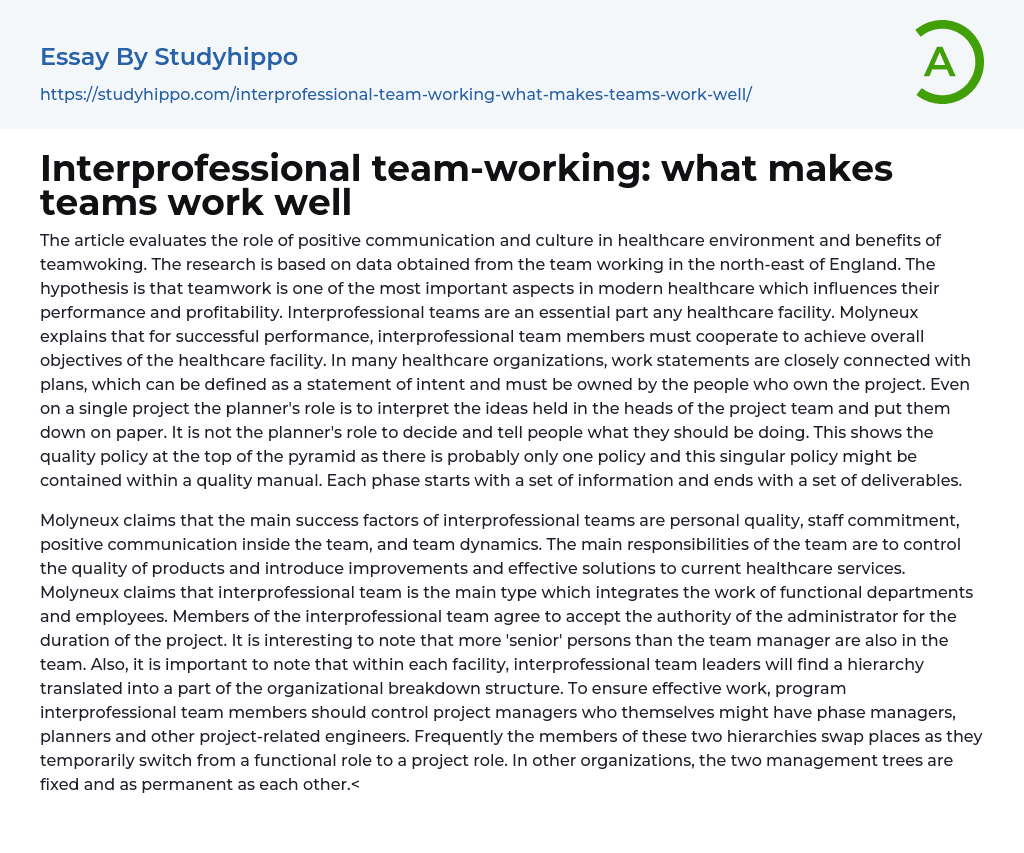

Interprofessional team-working: what makes teams work well Essay Example
The article evaluates the role of positive communication and culture in healthcare environment and benefits of teamwoking. The research is based on data obtained from the team working in the north-east of England. The hypothesis is that teamwork is one of the most important aspects in modern healthcare which influences their performance and profitability. Interprofessional teams are an essential part any healthcare facility. Molyneux explains that for successful performance, interprofessional team members must cooperate to achieve overall objectives of the healthcare facility. In many healthcare organizations, work statements are closely connected with plans, which can be defined as a statement of intent and must be owned by the people who own the project. Even on a single project the planner's role is to interpret the ideas held in the heads of the project team and pu
...t them down on paper. It is not the planner's role to decide and tell people what they should be doing. This shows the quality policy at the top of the pyramid as there is probably only one policy and this singular policy might be contained within a quality manual. Each phase starts with a set of information and ends with a set of deliverables.
Molyneux claims that the main success factors of interprofessional teams are personal quality, staff commitment, positive communication inside the team, and team dynamics. The main responsibilities of the team are to control the quality of products and introduce improvements and effective solutions to current healthcare services. Molyneux claims that interprofessional team is the main type which integrates the work of functional departments and employees. Members of the interprofessional team agree to accept the authority of
the administrator for the duration of the project. It is interesting to note that more 'senior' persons than the team manager are also in the team. Also, it is important to note that within each facility, interprofessional team leaders will find a hierarchy translated into a part of the organizational breakdown structure. To ensure effective work, program interprofessional team members should control project managers who themselves might have phase managers, planners and other project-related engineers. Frequently the members of these two hierarchies swap places as they temporarily switch from a functional role to a project role. In other organizations, the two management trees are fixed and as permanent as each other.
The interprofessional team should pay a special attention to ethical and social responsibility issues. Because self-managing members are working on permanent teams, the effort and expense involved in changing compensation structures is often justified. However, in more temporary teams, such as cross-functional or problem solving teams, other types of HR policy changes (for example, altering an evaluation system to include interprofessional team behaviors) may be more appropriate to encourage positive behaviors. In this company, team communication is one of the main elements which help the organization to create high performance teams and achieve further growth and development. Interprofessional teams are most effective when there is high task interdependence or a high degree of coordination and collaboration required between team members to accomplish tasks. Thus, a group of insurance sales agents who are geographically dispersed and have little interaction with one another to carry out their tasks would most likely be an inappropriate context in which to implement teams. The agents would probably see such
an effort as an empty, poorly developed strategy designed to capitalize on a healthcare management fad (Molyneux, 2001).
The research concludes that interprofessional teams are also more appropriate when the tasks that their members carry out are complex and well designed. Particularly in healthcare, interprofessional organizations need to have systems that help teams set realistic expectations. This allows them to stay motivated while at the same time remaining open to learning from feedback and mistakes. Doing so, often requires extending team members' task skills. In healthcare, Multi-skilled teamwork involves teams made up of individuals with multiple and overlapping skills that are deployed around the performance of a whole task, which represents a significant part of a larger work flow.
- Profession essays
- Labour Economics essays
- Occupational Safety And Health essays
- Pension essays
- Salary essays
- Strike Action essays
- Wage essays
- Career essays
- Workplace essays
- Homeless essays
- Working Together essays
- Career Path essays
- Hunter essays
- Farmer essays
- Nurse essays
- Pilot essays
- Professionalism essays
- Doctor essays
- Discipline essays
- Police Officer essays
- Labor essays
- Social Work essays
- Model essays
- Architect essays
- Engineer essays
- Administration essays
- Stakeholders essays
- Teamwork essays
- Caregiver essays
- Public Administration essays
- Raising Minimum Wage essays
- Interview essays
- Job Interview essays
- Career Choice essays
- Career Goals essays
- Portfolio essays
- Community Service essays
- Work-Life Balance essays
- Performance Appraisal essays
- Job essays
- Employee essays
- Skills essays
- Service essays
- Vocation essays
- Internship essays
- Work Experience essays
- Duty essays
- Dream Job essays
- Career Plan essays
- Working Time essays



